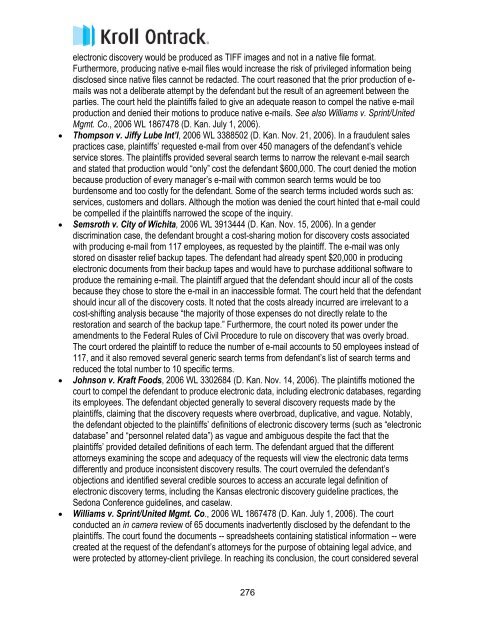Electronic Discovery and Computer Forensics Case List - Kroll Ontrack
Electronic Discovery and Computer Forensics Case List - Kroll Ontrack
Electronic Discovery and Computer Forensics Case List - Kroll Ontrack
You also want an ePaper? Increase the reach of your titles
YUMPU automatically turns print PDFs into web optimized ePapers that Google loves.
electronic discovery would be produced as TIFF images <strong>and</strong> not in a native file format.<br />
Furthermore, producing native e-mail files would increase the risk of privileged information being<br />
disclosed since native files cannot be redacted. The court reasoned that the prior production of emails<br />
was not a deliberate attempt by the defendant but the result of an agreement between the<br />
parties. The court held the plaintiffs failed to give an adequate reason to compel the native e-mail<br />
production <strong>and</strong> denied their motions to produce native e-mails. See also Williams v. Sprint/United<br />
Mgmt. Co., 2006 WL 1867478 (D. Kan. July 1, 2006).<br />
� Thompson v. Jiffy Lube Int’l, 2006 WL 3388502 (D. Kan. Nov. 21, 2006). In a fraudulent sales<br />
practices case, plaintiffs’ requested e-mail from over 450 managers of the defendant’s vehicle<br />
service stores. The plaintiffs provided several search terms to narrow the relevant e-mail search<br />
<strong>and</strong> stated that production would “only” cost the defendant $600,000. The court denied the motion<br />
because production of every manager’s e-mail with common search terms would be too<br />
burdensome <strong>and</strong> too costly for the defendant. Some of the search terms included words such as:<br />
services, customers <strong>and</strong> dollars. Although the motion was denied the court hinted that e-mail could<br />
be compelled if the plaintiffs narrowed the scope of the inquiry.<br />
� Semsroth v. City of Wichita, 2006 WL 3913444 (D. Kan. Nov. 15, 2006). In a gender<br />
discrimination case, the defendant brought a cost-sharing motion for discovery costs associated<br />
with producing e-mail from 117 employees, as requested by the plaintiff. The e-mail was only<br />
stored on disaster relief backup tapes. The defendant had already spent $20,000 in producing<br />
electronic documents from their backup tapes <strong>and</strong> would have to purchase additional software to<br />
produce the remaining e-mail. The plaintiff argued that the defendant should incur all of the costs<br />
because they chose to store the e-mail in an inaccessible format. The court held that the defendant<br />
should incur all of the discovery costs. It noted that the costs already incurred are irrelevant to a<br />
cost-shifting analysis because “the majority of those expenses do not directly relate to the<br />
restoration <strong>and</strong> search of the backup tape.” Furthermore, the court noted its power under the<br />
amendments to the Federal Rules of Civil Procedure to rule on discovery that was overly broad.<br />
The court ordered the plaintiff to reduce the number of e-mail accounts to 50 employees instead of<br />
117, <strong>and</strong> it also removed several generic search terms from defendant’s list of search terms <strong>and</strong><br />
reduced the total number to 10 specific terms.<br />
� Johnson v. Kraft Foods, 2006 WL 3302684 (D. Kan. Nov. 14, 2006). The plaintiffs motioned the<br />
court to compel the defendant to produce electronic data, including electronic databases, regarding<br />
its employees. The defendant objected generally to several discovery requests made by the<br />
plaintiffs, claiming that the discovery requests where overbroad, duplicative, <strong>and</strong> vague. Notably,<br />
the defendant objected to the plaintiffs’ definitions of electronic discovery terms (such as “electronic<br />
database” <strong>and</strong> “personnel related data”) as vague <strong>and</strong> ambiguous despite the fact that the<br />
plaintiffs’ provided detailed definitions of each term. The defendant argued that the different<br />
attorneys examining the scope <strong>and</strong> adequacy of the requests will view the electronic data terms<br />
differently <strong>and</strong> produce inconsistent discovery results. The court overruled the defendant’s<br />
objections <strong>and</strong> identified several credible sources to access an accurate legal definition of<br />
electronic discovery terms, including the Kansas electronic discovery guideline practices, the<br />
Sedona Conference guidelines, <strong>and</strong> caselaw.<br />
� Williams v. Sprint/United Mgmt. Co., 2006 WL 1867478 (D. Kan. July 1, 2006). The court<br />
conducted an in camera review of 65 documents inadvertently disclosed by the defendant to the<br />
plaintiffs. The court found the documents -- spreadsheets containing statistical information -- were<br />
created at the request of the defendant’s attorneys for the purpose of obtaining legal advice, <strong>and</strong><br />
were protected by attorney-client privilege. In reaching its conclusion, the court considered several<br />
276

















